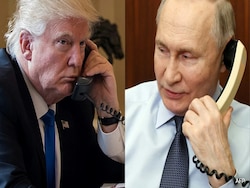Europe Adapts To New Trump Era With Diplomatic Shifts
In the wake of unprecedented diplomatic maneuvers by US President Donald Trump, European leaders are finding themselves navigating a rapidly changing geopolitical landscape. The outreach to Moscow regarding the ongoing tensions in Ukraine has sent shockwaves throughout Europe, prompting a flurry of diplomatic efforts from major capitals including Brussels, Paris, and London.
A Changing Political Landscape
The dialogue initiated by Trump has raised questions about the future of transatlantic relations, particularly as European nations reassess their positions on key issues such as NATO’s role in Eastern Europe and the sanctions imposed on Russia following its annexation of Crimea in 2014. European leaders are concerned that the US may be looking to reduce its commitment to European security, necessitating a more independent and cohesive approach from the EU itself.
Brussels: The Heart of European Diplomacy
Brussels, often seen as the political capital of Europe, has become a focal point for discussions on how the EU should respond to the shifting dynamics introduced by the Trump administration. High-level meetings involving EU foreign ministers have taken place frequently as they attempt to forge a unified stance towards Russia while also grappling with internal divisions on how best to achieve this goal.
European Unity Under Strain
In Paris, President Emmanuel Macron has voiced his support for a more robust European defense strategy, asserting that Europe must be prepared to patrol its own borders without relying exclusively on US support. Meanwhile, in London, Prime Minister Boris Johnson, amid ongoing Brexit negotiations, is advocating for a stronger bilateral relationship with the US while also ensuring that the UK maintains a responsible approach to Russia. These efforts highlight the delicate balance European leaders are trying to achieve amidst growing uncertainty.
Meeting the Challenges Ahead
The tangible result of this diplomatic frenzy has led to an increase in dialogues between European nations and Moscow. Leaders like Macron and German Chancellor Angela Merkel have been more vocal about the importance of engaging with Russia—even as they insist on not compromising on fundamental democratic principles and human rights.
This new era underscored by Trump’s policies will pose significant challenges for Europe, compelling it to recalibrate not only its diplomatic strategies but also its long-term security architecture. The implications of these shifts will resonate for years to come as Europe adapts to an uncertain international order where the rules of engagement are being rewritten.
Conclusion
As the Trump administration continues to pursue its distinct foreign policy, the call for European nations to think critically about their unity and approach signifies a pivotal moment in international relations. The actions taken today could very well set the tone for how Europe interacts not only with the US but also with Russia and other global powers in the future. Navigating this new reality will require diplomatic acumen and a commitment to solidarity among European leaders as they strive for stability in an unpredictable world.



